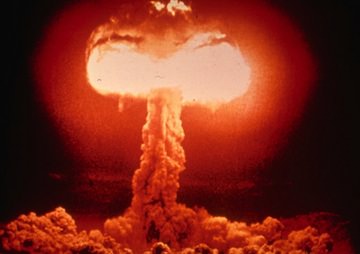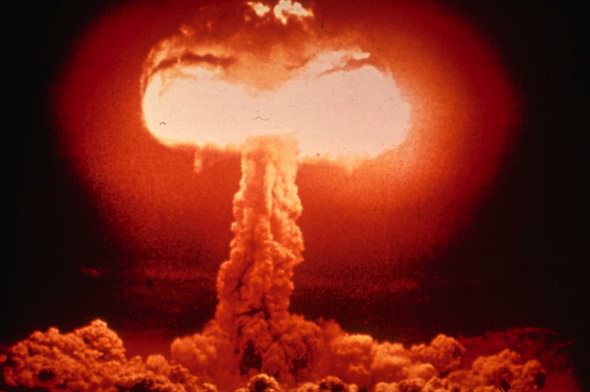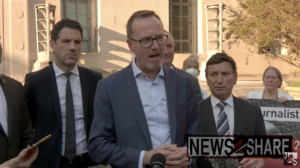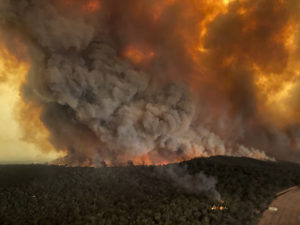Professors Plead With Greens to Accept Nuclear Power
Academics argue that nuclear power is essential to save the planet from climate change, but critics say they seem to have forgotten the danger of a nuclear winter.
By Paul Brown, Climate News Network

Nuclear power and proliferation are inseparable: Conflict could devastate the environment. Photo by US Federal Emergency Management Agency via Wikimedia Commons
This Creative Commons licensed piece first appeared at Climate News Network.
LONDON — Seventy-five professors from the world’s leading universities have signed a letter urging environmentalists to re-think their attitude to nuclear power as a way to save the planet from climate change and preserve its animals, plants and fish.
Ironically, it is two Australian academics who came up with the research. They come from a country whose government has repudiated the Kyoto Protocol, reversed measures to cut climate change, is one of the world’s biggest coal exporters, and has no nuclear power. Australia has just recorded the hottest spring since records began 100 years ago.
The two professors are Barry W. Brook, Chair of Environmental Sustainability at the University of Tasmania, and Corey J.A. Bradshaw, Sir Hubert Wilkins Chair of Climate Change at the University of Adelaide’s Environment Institute. Their backers include many leading experts on ecology, biodiversity, evolution and geography from the US, UK, China and India.
The letter is significant because previous pleas for a role for nuclear power have mostly come from physics professors, who could reasonably be said to love the technology for its own sake.
But this group has no stake in nuclear power, and their argument is based purely on the need to save the planet and its species from overheating and excess use of valuable land for renewables. Professors Brook and Bradshaw have had a paper published in the magazine Conservation Biology, in which they evaluated all possible forms of energy generation. Wind and nuclear power had the highest “benefit-to-cost ratio”.
“…we entreat the conservation and environmental community to weigh up the pros and cons of different energy sources…”
The letter urges environmentalists to read the paper, and says the two professors “provide strong evidence for the need to accept a substantial role for advanced nuclear power systems with complete fuel recycling — as part of a range of sustainable energy technologies that also includes appropriate use of renewables, energy storage and energy efficiency.
“This multi-pronged strategy for sustainable energy could also be more cost-effective and spare more land for biodiversity, as well as reduce non-carbon pollution (aerosols, heavy metals).
“Given the historical antagonism towards nuclear energy amongst the environmental community, we accept that this stands as a controversial position.
“However, much as leading climate scientists have recently advocated the development of safe, next-generation nuclear energy systems to combat global climate change, we entreat the conservation and environmental community to weigh up the pros and cons of different energy sources, using objective evidence and pragmatic trade-offs, rather than simply relying on idealistic perceptions of what is ‘green’.
“Although renewable energy sources like wind and solar will likely make increasing contributions to future energy production, these technology options face real-world problems of scalability, cost, material and land use, meaning that it is too risky to rely on them as the only alternatives to fossil fuels.
Conflict risk
“Nuclear power — being by far the most compact and energy-dense of sources — could also make a major, and perhaps leading, contribution. As scientists, we declare that an evidence-based approach to future energy production is an essential component of securing biodiversity’s future and cannot be ignored. It is time that conservationists make their voices heard in this policy arena.”
The letter has attracted a wide variety of comments. Some are supportive, but others say that the professors have ignored one of the greatest threats to the planet — a nuclear war.
Dr Jim Green, writing in the Ecologist magazine, makes the point that nuclear power and nuclear proliferation go hand in hand: “Even a modest exchange of nuclear warheads could profoundly affect biodiversity, and large scale nuclear war certainly would.”
Dr Green also attacks the paper for endorsing fast breeder reactor technology as the solution to climate change. He says that the “fast reactor techno-utopia presented by Brook and Bradshaw is theoretically attractive”, but has already been tried unsuccessfully, and cannot be made to work in the real world.
Your support matters…Independent journalism is under threat and overshadowed by heavily funded mainstream media.
You can help level the playing field. Become a member.
Your tax-deductible contribution keeps us digging beneath the headlines to give you thought-provoking, investigative reporting and analysis that unearths what's really happening- without compromise.
Give today to support our courageous, independent journalists.






You need to be a supporter to comment.
There are currently no responses to this article.
Be the first to respond.